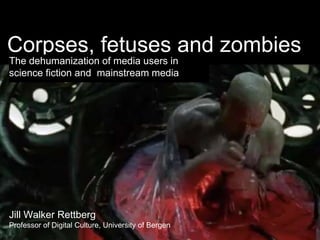Corpses, Fetuses And Zombies: The Dehumanization of Media Users in Science Fiction and Mainstream Media
- 1. Corpses, fetuses and zombies The dehumanization of media users in science fiction and mainstream media Jill Walker Rettberg Professor of Digital Culture, University of Bergen
- 2. The Matrix (1999) Human as foetus
- 3. Eric Pickersgill: Removed (2015) http://www.removed.social
- 5. I am saddened by the use of technology for interaction in exchange for not interacting. This has never happened before. ÔÇöEric Pickersgill, 2015
- 6. William Smith: Morley: Ancient and Modern. 1886. Page 75.
- 9. This isnÔÇÖt about the problems of digital connection, itÔÇÖs about propping oneself up as more human and alive. By identifying with and sharing the video, we can put ourselves in the protagonistÔÇÖs shoes. I too recognize this! I am human and deep and carpe diem. But letÔÇÖs consider the implication of showing others as robots who donÔÇÖt live in the moment: you are basically saying they are less human in order to assert how above the unthinking-cellphone-zombie masses you are. Nathan Jurgenson, http://thesocietypages.org/cyborgology/2013/08/26/the-problem- with-the-i-forgot-my-phone-video/
- 11. Zombie Corpse Fetus Undead or brainwashed. No free will, cannot communicate. Human body but no longer alive. Human body but not yet independent or able to communicate.
- 12. The Matrix: Neo wakes up in his real body
- 14. It was like coming into the cold marbled room of a mausoleum after the moon had set. Complete darkness, not a hint of the silver world outside, the windows tightly shut, the chamber a tomb-world where no sound from the great city could penetrate. The room was not empty. Ray Bradbury: Fahrenheit 451.
- 15. Without turning on the light he imagined how this room would look. His wife stretched on the bed, uncovered and cold, like a body displayed on the lid of a tomb, her eyes fixed to the ceiling by invisible threads of steel, immovable. And in her ears the little Seashells, the thimble radios tamped tight, and an electronic ocean of sound, of music and talk and music and talk coming in, coming in on the shore of her unsleeping mind. The room was indeed empty. Every night the waves came in and bore her off on their great tides of sound, floating her, wide-eyed, toward morning. There had been no night in the last two years that Mildred had not swum that sea, had not gladly gone down in it for the third time. Ray Bradbury, Fahrenheit 451, 19
- 16. Wall-E - humans locked in chairs.
- 18. Divergent (2014): People enslaved by a serum combined with t
- 19. Divergent (2014)
- 20. Zombie Corpse Fetus Undead or brainwashed. No free will, cannot communicate. Human body but no longer alive. Human body but not yet independent or able to communicate.
- 21. read more: jilltxt.net / @jilltxt





















